When Love Meets Resistance: How to Care for an Aging Parent Who Wants None of It

Family caregivers face unique challenges when aging parents refuse help. Learn three proven strategies—including PACE programs and Health and Life Navigation Specialists—to break through resistance while honoring dignity. Plus, discover why ensuring your parent's advance directives are current and you have medical access is critical.
When Your Loved One Isn’t Quite Themselves: Understanding Confusion and Delirium

Understanding the differences between confusion, delirium, and depression can be challenging for caregivers. This comprehensive guide provides practical, evidence-based methods to help you recognize what your loved one is experiencing, when to seek professional help, and how to provide the best support—even when cognitive decline is present.
Protecting Your Loved One: Why Advance Planning Matters for Dementia Patients Facing Hospitalization
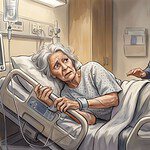
When nursing home residents with dementia face hospitalization, families often discover critical gaps in advance care planning. Studies show most dementia patients lack DNR orders, and hospice referrals remain rare despite distressing hospital experiences. Learn how proactive planning—including palliative care, hospice eligibility, and proper DNR documentation—can protect your loved one's comfort and dignity.
A Calmer Approach: Understanding and De-Escalating Patient Agitation

Patient agitation can feel overwhelming, but de-escalation techniques rooted in compassion can make a real difference. Discover the CALMER framework—six practical communication skills designed to help you recognize early warning signs, calm tense situations, and build trust even during difficult moments.
The Gap Between Generic Forms and True Peace of Mind: A Guide to Meaningful Advance Directives

Everyone 18 and older needs advance directives, but how do you choose between free forms, attorneys, or end-of-life doulas? We break down the costs, pros, and cons of each to help you ensure your medical wishes are honored.
The Hidden Costs of Hospice Fraud: Protecting Patients and Families

Hospice fraud not only harms terminally ill patients but also devastates their caregivers and families. This article explores the impacts and offers tips on choosing a reliable hospice provider.
Finding Your Voice: How Nurses and Doctors Can Confidently Initiate End-of-Life Conversations

As a nurse or doctor, you have the power to transform patient care through timely end-of-life conversations. This guide provides practical strategies to help you confidently discuss prognosis, encourage advance care planning, and introduce hospice care when appropriate—across hospitals, nursing facilities, and more.
Finding Your Way Through Traumatic Loss: A Compassionate Guide to Emotional Coping and Healing

When trauma and grief collide after suicide, homicide, or sudden accidents, the pain can feel unbearable. This guide offers practical coping strategies, self-care techniques, and professional resources to help you navigate traumatic loss. Learn the difference between grief support options and discover pathways toward healing.
Supporting Your Loved One with Multiple Myeloma: A Guide to Compassionate Care From Diagnosis Through End-of-Life
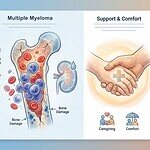
This comprehensive guide helps patients, families, and caregivers understand Multiple Myeloma diagnosis and staging, explore survival expectations, and navigate palliative and hospice care options. Discover practical caregiving strategies and when early palliative care can enhance quality of life.
When Dementia and Seizures Intersect: A Caregiver’s Guide to Recognition, Management, and Compassionate Care
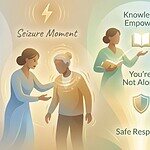
When someone you love has dementia, seizures may become part of their journey. Learn which types of dementia increase seizure risk, how to recognize and respond to seizures safely, when to call for emergency help, and which medications may affect seizure risk. This compassionate guide empowers caregivers with knowledge and confidence.
Building Confidence in Home Hospice: A Proven Path to Better Patient Care

Hospice providers have proven strategies to reduce symptom burden and boost satisfaction scores. Discover how combining nurse practitioner telehealth visits, educational videos, and end-of-life doula support transforms caregiver confidence and patient comfort in home-based care.
Beyond Medical Care: How End-of-Life Doulas Transform the Journey for Patients and Families

End-of-life doulas offer untapped potential as compassionate partners in healthcare. These trained professionals complement hospice care by providing extended emotional and spiritual support, serving as life transition coaches long before hospice is needed—enhancing end-of-life experiences for families.
Understanding Acute Myeloid Leukemia: A Compassionate Guide to Disease Progression, Symptom Management, and End-of-Life Care

Navigate the journey of acute myeloid leukemia with confidence. This comprehensive guide covers disease progression, comfort-focused symptom management, and practical palliative and hospice care timing advice.
Why Planning for Long-Term Care Today Protects Your Family’s Tomorrow: The Critical Role of Elder Law Attorneys and Health and Life Navigation Specialists

A heartbreaking Facebook post reveals the devastating reality when families don't plan ahead for long-term care. Learn how Medicaid Asset Protection Trusts and working with life transition coaches years in advance can protect your home, savings, and dignity—and why the five-year lookback means you must act now.
Living Without Regret: What 300 Dying Patients Taught Us About What Truly Matters

After 15 years and 300 final breaths, nurse Laura M. discovered seven profound truths about what truly matters in life. Her patients didn't fear dying—they feared not having really lived. Learn these life-changing lessons and discover how life transition coaches can help you live with fewer regrets and ensure your wishes are honored.
The Transformative Role of Death Doulas: Bridging Gaps in End-of-Life Care

End-of-life doulas provide non-medical support that transforms dying experiences through education, emotional companionship, and advocacy. Learn how these trained professionals help patients and families navigate terminal illness with dignity, how healthcare providers can partner with doulas, and what to look for when selecting one.
Understanding Anticipatory Grief: How Loving Deeply Means Grieving Before Goodbye

Anticipatory grief is a normal, natural response to an expected loss that shows the depth of your love. This guide explains what anticipatory grief is, why it happens, how grief coaches and licensed counselors can help, and practical steps for families and caregivers to express feelings and find support during this difficult time.
Finding Peace in Loss: How End-of-Life Doulas and Health and Life Navigation Specialists Support Families Through Grief

Quality end-of-life care reduces complicated grief among families. Research shows that families who feel supported and witness dignified care experience fewer prolonged grief reactions. Learn how life transition coaches and end-of-life doulas provide essential emotional, spiritual, and practical support that bridges gaps in healthcare, helping families navigate loss with greater peace and understanding.
Finding Comfort Through Palliative Radiation: A Guide for Patients, Families, and Healthcare Providers
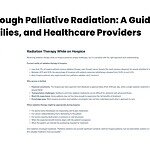
Palliative radiation therapy offers targeted symptom relief for patients with advanced cancer, reducing pain, bleeding, and other distressing symptoms. This comprehensive guide empowers patients and families to understand treatment options, manage side effects, and make informed decisions that prioritize comfort and quality of life.
The Hidden Crisis: Why Earlier Hospice Care Can Extend Life and Transform End-of-Life Experiences

Despite Medicare's six-month hospice benefit, most patients receive care for only 18-21 days, often when already transitioning to death. Research shows early hospice enrollment can extend life by 29-81 days while dramatically improving quality of life. Life transition coaches help families navigate earlier hospice and palliative care adoption for better outcomes.
Three Wishes: What a Dying Patient Taught Me About Living Without Regrets

A hospice nurse reflects on a powerful moment with a dying patient who painted "Three Wishes"—dandelions symbolizing childhood innocence and life's fleeting nature. This experience teaches us to examine how we're living, who we love, and what matters most. Learn why advance directives and living with fewer regrets matter for everyone.
Making Compassionate Care Accessible: A Guide to Sliding Scale Fees for End-of-Life Doulas

Looking to determine appropriate pricing for end-of-life doula services? This detailed guide compares sliding-scale fees with full-price and donation-based options. Learn effective strategies for establishing fair rates, applying a sliding-scale system, and ensuring compassionate care remains affordable for all families.
Understanding PACE: A Complete Guide to All-Inclusive Care That Keeps Seniors Home
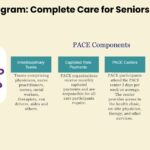
The Program of All-Inclusive Care for the Elderly (PACE) provides essential support for seniors who require nursing home-level care but wish to remain in their communities. This comprehensive guide outlines eligibility requirements, available services, associated costs, and how PACE’s team-based approach helps older adults maintain their independence while receiving quality healthcare.
What Matters Most: The Three Things People Want Before They Die

A palliative care doctor shares people's three most common wishes at the end of life: mending relationships, expressing gratitude, and saying "I love you." Planning for a good death with the help of a life transition coach can help you accomplish more meaningful goals and ensure your final days reflect your values.
